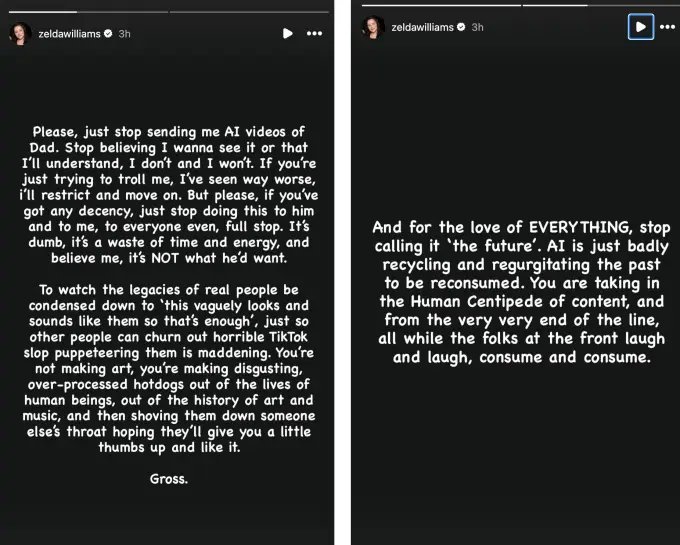Zelda Williams Calls for Respect Amid AI Deepfake Controversy
Zelda Williams, the daughter of the late actor Robin Williams, has issued a heartfelt plea to fans regarding the use of artificial intelligence (AI) to create deepfake videos of her father. In a candid Instagram story, she expressed her discomfort with the trend, urging fans to cease sending her AI-generated videos that feature her father’s likeness. “Please, just stop sending me AI videos of Dad. Stop believing I wanna see it or that I’ll understand. I don’t and I won’t,” she wrote. Williams emphasized the emotional toll this practice takes on her and others, stating, “If you’ve got any decency, just stop doing this to him and to me, to everyone even, full stop. It’s dumb, it’s a waste of time and energy, and believe me, it’s NOT what he’d want.”
The Rise of AI Deepfakes
Williams’ comments come in the wake of the recent launch of OpenAI’s Sora 2 video model and Sora social app, which allow users to generate highly realistic deepfakes. This technology has sparked a heated debate about the ethical implications of using AI to recreate the likenesses of deceased individuals. While the app has restrictions on generating videos of living people without their consent, it appears to have no such limitations for the deceased. This raises significant ethical questions about consent and representation, particularly for those who can no longer voice their opinions.
The legal landscape surrounding deepfakes is murky. According to the Student Press Law Center, it is not illegal to libel the deceased, which complicates the ethical considerations surrounding the use of AI in this manner. The absence of legal repercussions for deepfaking dead individuals has led to a proliferation of videos featuring historical figures and celebrities, including Martin Luther King Jr., John Lennon, and, notably, Robin Williams himself.
The Ethical Dilemma
Zelda Williams’ outcry highlights a growing concern among families of deceased public figures. The emotional impact of seeing a loved one’s likeness manipulated for entertainment purposes can be profound. “To watch the legacies of real people be condensed down to ‘this vaguely looks and sounds like them so that’s enough,’ just so other people can churn out horrible TikTok slop puppeteering them is maddening,” she lamented. This sentiment resonates with many who believe that the dignity of the deceased should be preserved, rather than commodified for fleeting online entertainment.
The Sora app has already been inundated with videos of various deceased personalities, raising questions about the ethical responsibilities of AI developers. OpenAI has yet to clarify its stance on the permissibility of deepfaking deceased individuals, leaving many to speculate about the company’s ethical framework. Critics argue that the company’s approach is reckless, particularly given the potential for misuse and the emotional distress it can cause to families.
The Broader Implications of AI Technology
The advent of AI technologies like Sora 2 has sparked a broader conversation about the implications of deepfake technology. While the potential for creativity and innovation is vast, the risks associated with misuse are equally significant. The ability to create hyper-realistic videos of anyone-living or dead-opens the door to a myriad of ethical dilemmas. As AI technology continues to evolve, the line between reality and fabrication becomes increasingly blurred.
OpenAI’s critics have pointed out that the company has taken a lax approach to copyright and ethical considerations. Initially, CEO Sam Altman stated that Hollywood studios and agencies would need to explicitly opt out if they did not want their intellectual property included in Sora-generated videos. This stance drew ire from the Motion Picture Association, which emphasized that established copyright laws should protect creators’ rights. Following backlash, Altman indicated that the company would reconsider its position, but the damage had already been done.
The Future of AI and Ethics
As AI technology becomes more accessible, the potential for misuse grows. Sora is considered one of the most advanced deepfake-capable AI models available, raising alarms about the ethical implications of its use. Other platforms, such as xAI, have even fewer safeguards, allowing for the creation of pornographic deepfakes of real individuals. This lack of regulation poses a significant threat to personal privacy and dignity, particularly for those who cannot defend themselves.
The ethical considerations surrounding AI-generated content are not merely academic; they have real-world consequences. As society grapples with the implications of these technologies, it is crucial to establish guidelines that prioritize respect for individuals-both living and deceased. The conversation initiated by Zelda Williams serves as a poignant reminder of the human cost associated with technological advancements.
Conclusion
Zelda Williams’ heartfelt plea underscores the urgent need for a dialogue about the ethical implications of AI technologies, particularly in the realm of deepfakes. As the capabilities of AI continue to expand, society must confront the moral responsibilities that come with such power. The legacy of individuals like Robin Williams deserves to be honored, not exploited. As we navigate this complex landscape, it is imperative to prioritize respect, dignity, and consent in our interactions with technology. The future of AI should not come at the expense of our humanity.











